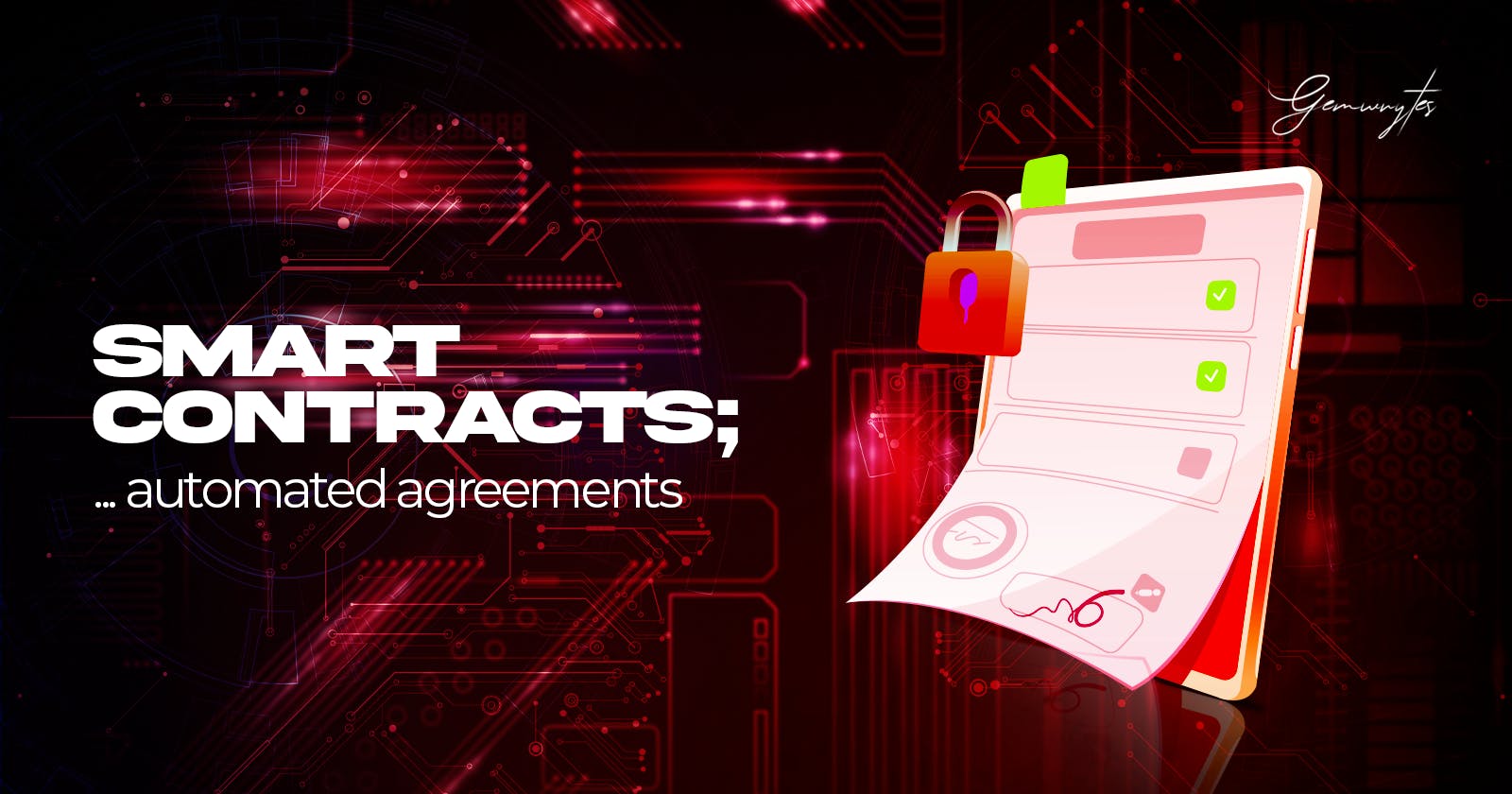SMART CONTRACTS; Automated agreement
Part 2b: Understanding technical underpinnings of Web 3.0...
Smart contracts are simply programs stored on a blockchain that run when predetermined conditions are met. ~Google
INTRODUCTION
Web 3.0; the next evolution of the internet, offers a decentralized and open web that is more secure and transparent. One of the core technologies that enable Web 3.0 is the Smart Contract. In this article, we will explore what smart contracts are, how they work, and their role as a technical underpinning of Web 3.0.
WHAT IS A SMART CONTRACT?
A smart contract is a self-executing digital contract that automates the process of verifying and enforcing the terms of an agreement between two or more parties. Smart contracts use blockchain technology to record and execute the terms of the contract, ensuring that all parties involved in the agreement are bound by the same rules.
Smart contracts are written in programming languages, such as Solidity, and run on blockchain networks like Ethereum, Binance Smart Chain, and many others. They are essentially computer programs that are designed to replace traditional legal contracts and facilitate transactions without the need for intermediaries.
HOW DO SMART CONTRACTS WORK??
Smart contracts work by automating (self-exciting) the process of verifying and enforcing the terms of an agreement. Once the terms of the agreement are agreed upon by all parties involved, the smart contract is deployed on the blockchain network. The terms of the agreement are then encoded in the smart contract, and the contract is programmed to execute automatically when certain conditions are met.
For example, if you wanted to buy a product from a vendor, you could use a smart contract to automate the transaction. The smart contract would be programmed to release the payment to the vendor automatically once you receive the product, ensuring that both parties are bound by the same rules and that the transaction is transparent and secure.
BENEFITS OF SMART CONTRACTS IN WEB3.0
Smart contracts offer several benefits in Web 3.0, including:
• Decentralization: Smart contracts eliminate the need for intermediaries, such as banks, lawyers, and other third-party services, to facilitate transactions. This decentralization reduces costs, speeds up transactions, and increases transparency.
• Security: Smart contracts are tamper-proof, meaning that the terms of the contract cannot be changed or modified once they are deployed on the blockchain network. This ensures that all parties involved in the agreement are bound by the same rules, and there is no risk of fraud or manipulation.
• Efficiency: Smart contracts automate the process of verifying and enforcing the terms of an agreement, reducing the need for manual processes and paperwork. This makes transactions faster, cheaper, and more efficient.
• Decentralized Applications (DApps): Decentralized applications, or DApps, are a critical component of Web 3.0, enabling users to interact with blockchain networks and access decentralized services. DApps rely on smart contracts to automate transactions and enforce the rules of the application.
For example, a decentralized lending platform could use a smart contract to automate the process of lending and borrowing. The smart contract would be programmed to release the funds to the borrower once certain conditions are met, such as providing collateral or meeting the repayment terms. This eliminates the need for intermediaries, such as banks, and makes the lending process more transparent, secure, and efficient.
• Internet of Things (IoT): The Internet of Things (IoT) is a network of interconnected devices, sensors, and appliances that can communicate with each other and with humans. IoT devices are becoming increasingly prevalent, with estimates suggesting that there will be over 30 billion IoT devices by 2025.
Smart contracts can play a significant role in the IoT, enabling devices to interact with each other and exchange securely and trans For example, a smart contract could be used to automate the process of paying for electricity consumption in a smart home. The smart contract would be programmed to monitor the energy usage of various appliances in the home and automatically deduct the payment from the homeowner's account.
Smart contracts can also be used to automate the process of supply chain management. For example, a smart contract could be used to track the journey of a product from the manufacturer to the end consumer, ensuring that all parties involved in the supply chain are bound by the same rules and that the transaction is transparent and secure.
CHALLENGES OF SMART CONTRACTS IN WEB 3.0
While smart contracts offer several benefits in Web 3.0, they also face some challenges, which would be important to note. Some of which are:
• Security vulnerabilities: Smart contracts are written in programming languages, and like any other computer program, they are susceptible to bugs and vulnerabilities. A single vulnerability in a smart contract can result in significant losses, and therefore, it is crucial to thoroughly test smart contracts before deploying them on a blockchain network.
• Lack of standardization: There is currently no standardization in the development of smart contracts, and this can lead to interoperability issues between different blockchain networks. This lack of standardization also makes it difficult for developers to build complex applications on top of smart contracts.
• Regulatory challenges: The legal status of smart contracts is still unclear in many jurisdictions, and this can pose challenges for businesses that want to use smart contracts for commercial transactions. There is a need for regulatory clarity to encourage the widespread adoption of smart contracts in commercial transactions.
Conclusion
Smart contracts are a crucial component of Web 3.0, offering decentralized, secure, and transparent transactions without the need for intermediaries. Smart contracts are being used in a variety of applications, including decentralized finance, supply chain management, and the Internet of Things. While smart contracts offer several benefits, they also face some challenges, including security vulnerabilities, lack of standardization, and regulatory challenges. However, with continued research and development, smart contracts have the potential to revolutionize the way we conduct transactions in the digital age.

